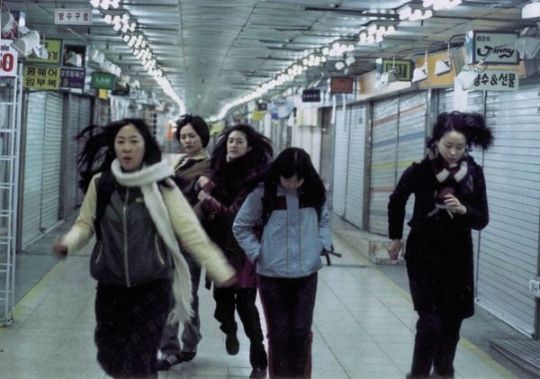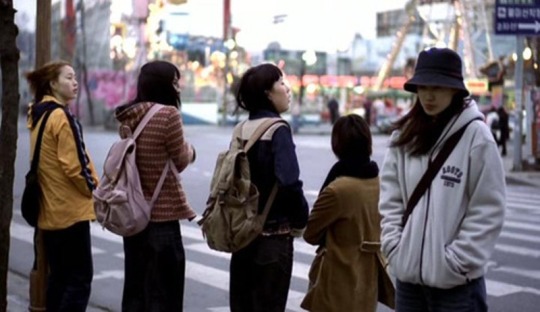#take care of my cat

five high school friends, after graduation, embark on diverse and sometimes divergent paths to adulthood, creating a quiet movie of change and disruption. the movie is quiet not because it literally is - in fact, it is quite opposite, with the chatter and shrieks of five twenty year old girls. the movie is quiet because the movie is firmly centred on relatable characters that have been crafted with warmth, instead of theatrics and absurdist plots. (i was pretty sure, without checking, that take care of my cat is directed by a female - the sensitive dynamics of schoolgirl friend groups would not have been achieved by a male hand)
the film is centered around hye-joo (played by a young lee yo-won), tae-hee (played by the inimitable bae doona), and ji-young (played by ok ji-young). the other 2 girls - ethnic Chinese twins - are left as side characters. hye-joo is pretty and ambitious. but beneath her surface obsession about self-improvement and corporate progression lies insecurity that stems from the violence of her divorced parents and her lack of a college education. tae-hee comes from a normal middle-class family who runs a hot stone public bath, and her relatively well-off background allows her to be free from job-searching. she channels her energy in kind-hearted ways. beyond working for the family business, she volunteers to be a typist for a poet with cerebral palsy and makes friends with southeast asian immigrants near the port. ji-young, orphaned at an early age, lives with her grandparents in a shanty / container house that eventually collapses and leaves ji-young all alone. she has dreams of pursuing textile design overseas, but her poverty is continually compounded by unfriendly state support (she cannot find a part time job without guardians’ verification, and she is sent to juvenile detention after her grandparents’ death). she adopts a cat, which is passed on from friend to friend, hence the film name.

most of the film’s plot is around the dynamics of the 3, where ji-young and hye-joo grow apart and tae-hee remains loyal by ji-young. hye-joo is frustrated at ji-young’s self-pity and moodiness, ji-young is aggravated by hye-joo’s moral high horse and condescension. tae-hee plays mediator, but in her desire to keep the group together, she sticks too much to the presets of the past without realising friendships must evolve over time too. when hye-joo asks tae-hee why she is calling during work hours, tae-hee says “you used to call me all the time for no particular reason, too, in the past, why can’t i do the same now?”. at 2 hours, though, the film gets draggy at certain points, but the relatability of the characters somehow sustains the viewer’s interest. bae doona is such a natural and such a pleasure to watch too!
i really liked the setting choice of incheon - which embodies the film’s theme of modernisation and change. there are plenty of scenes of incheon’s port life (fishermen going out to sea and sorting their loot in early dawns) and incheon’s town (where small business owners are starting to hang big neon signboards and a swanky new international airport is opening). people from incheon are unapologetically less modern than the people in seoul. we see tae-hee’s parents order american ribs from tony roma in a traditional korean way (”why must we look at the menu in such detail. just give me what’s most popular here. if it’s not good we’ll look for you!”); we see people arriving off cruise ships with boxes and luggages, trying to make a living by importing goods; we see the twins’ chinese grandparents living in a chinese ethnic enclave that barely resembles korea; we see immigrants from myanmar and philippines speaking relatively fluent korean, amidst government posters warning against illegal immigration.
the symbolism of the cat as the girls’ relationship is less fascinating to me than the symbolism of incheon representing the girls’ fringe positions in society and the girls’ growth. the girls may not have been given the best lots in life, but no matter the paths the girls take, incheon’s inclusivity always has a place for them. – 8/10
If you had your rent, utilities, and your food taken care of and didn’t have to worry about your basic essential needs for survival, what would you do? If you were not required to work, would you still work? Would you put all of your free time into creative endeavors? Would you watch Netflix all day?
